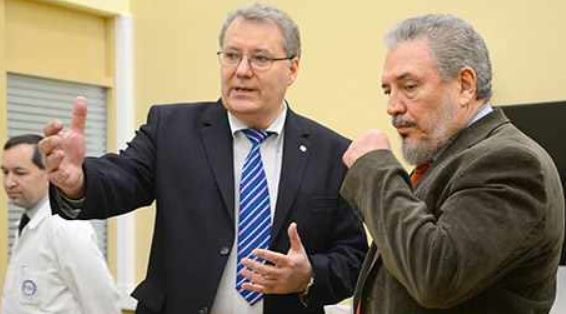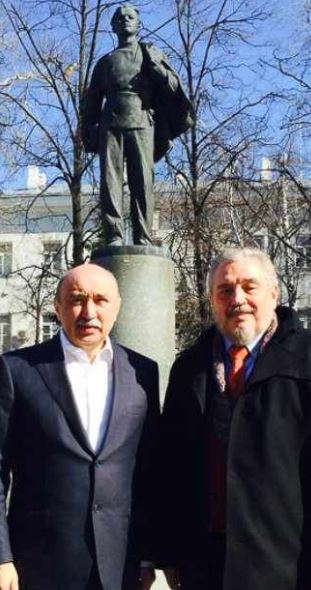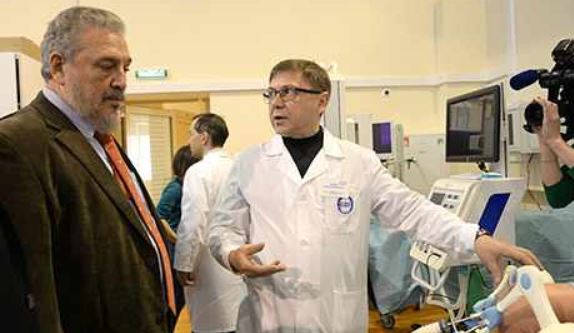
Fidel Jr.: Cuba and Russia need to share scientific knowledge
Continuing his mission to increase contacts between the scientific communities of Cuba and the Russian Federation, Fidel Castro Díaz-Balart traveled Wednesday (April 1) to Kazan to visit the Institute of Basic Medicine and Biology of the Kazan Federal University (KFU).
Castro, eldest son of the revolutionary leader, is science advisor to the Cuban government. On this trip, he was accompanied by Cuba’s ambassador to Russia, Emilio Losada García.

The Cuban visitors were welcomed by Ishat Gafurov, the institute’s dean; Dmitri Tayurski, the vice dean (in photo above); and Dr. Andrei Kiasov, the medical school’s director.
The tour began with a demonstration of the teaching techniques at the Simulation Center, which involve the use of computerized mannequins on which the students can learn first aid, obstetrics and surgery and become familiar with equipment such as X-ray and ultrasound machines.
The computerized techniques, which can be described as “state of the art,” are not yet widespread in Russian medical schools and are a source of pride to KFU.
As a result of Castro’s visit, the institute agreed to enroll 100 Cuban students this year in graduate and post-graduate studies in medicine, biotechnology and nanotechnology. It also agreed to intensify joint research with Cuba.
“You cannot develop science in a single country,” Professor Tayurski told reporters. “All projects in the era of globalization should be interfaith and intercontinental. For example, the vaccine for hepatitis-B, which was introduced in Cuba, is very interesting to us.
“I think we have something to give to each other, especially if we take into account that Cuban medicine occupies a leading spot in the Caribbean basin,” the vice dean said.
In the period between 1978 and 1988, 250 Cubans went through the Kazan medical school, but the scholarship program ended when the Soviet Union was dissolved in 1991.
Many of those students work today in Cuba and other parts of the world and have formed a society (some might call it a fraternity) of KFU graduates in Havana.
Efforts to resume cooperation between Kazan and Havana began last year, Castro told reporters, with a visit he made to President Rustam Minnikhanov that resulted in an exhibition on the achievements of Cuban researchers in the field of medicine.
“A cooperation agreement was then signed by the University of Havana’s Center for Genetic Engineering and Biotechnology and KFU,” Castro said. “In December, a delegation of Cuban educators met with Tatar university professors and officials. It was then that the agreement was reached to bring Cuban students [to Kazan].

“I am here to support and reinforce the cooperation between our two countries, maybe not as massive [as in 1978-88] but more targeted. You have a great medical center for the training of qualified professionals, and we have made some advancements in biotechnology and nanotechnology.
“We [in Cuba] have developed more than 50 third-generation drugs that are sold in 60 countries around the world. Each country holds a strong hand; why not play them?” Castro continued.
“I hope that, with each passing year, the KFU and the research centers of the Republic of Cuba will find new vectors for cooperation in development,” the Cuban visitor said. “And I very much hope that the relations we had in Soviet Union days will be renewed.”
Castro’s program for the day included a tour of the Center for Quantum Technologies at the Institute of Physics, but his visit was interrupted by news from Moscow that Ambassador Losada’s chief aide had suffered a heart attack. Castro and Losada hurried back to Moscow but not without first stopping for a photograph at the monument for Vladimir Lenin, who entered Kazan University in 1887.
Tatarstan is about 500 miles southeast of Moscow, between the Volga and Kama rivers; it extends east to the Ural Mountains. It is one of the most economically developed regions of Russia. Its capital, Kazan (pop. 3.8 million), is one of the Russian Federation’s largest and most prosperous cities.


